牛津译林版六年级下册Unit5-6复习课件(共36张PPT)
文档属性
| 名称 | 牛津译林版六年级下册Unit5-6复习课件(共36张PPT) |  | |
| 格式 | zip | ||
| 文件大小 | 1.3MB | ||
| 资源类型 | 教案 | ||
| 版本资源 | 牛津译林版 | ||
| 科目 | 英语 | ||
| 更新时间 | 2022-05-11 19:21:58 | ||
图片预览

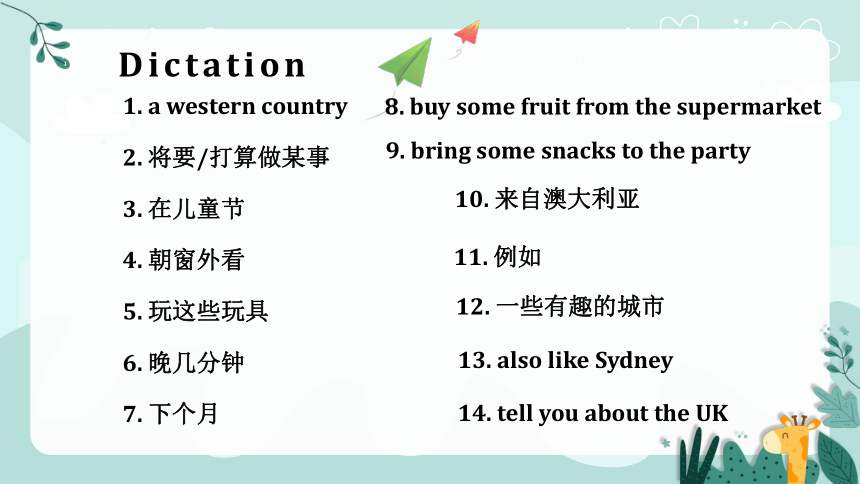

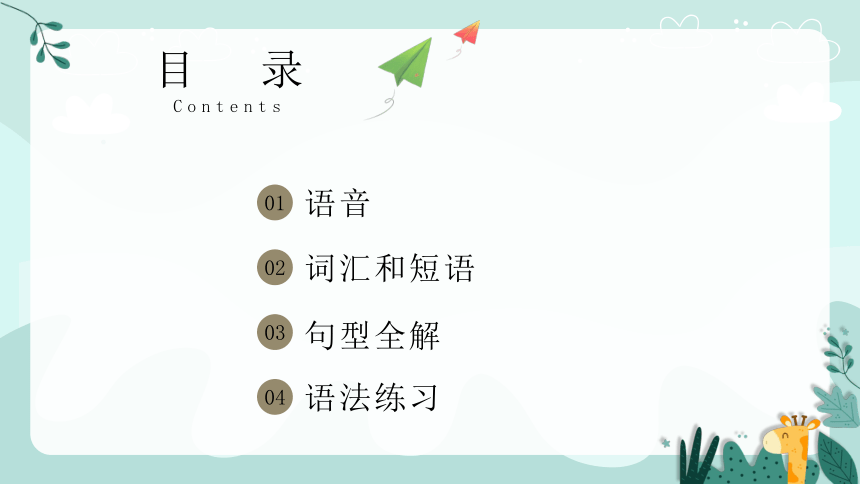
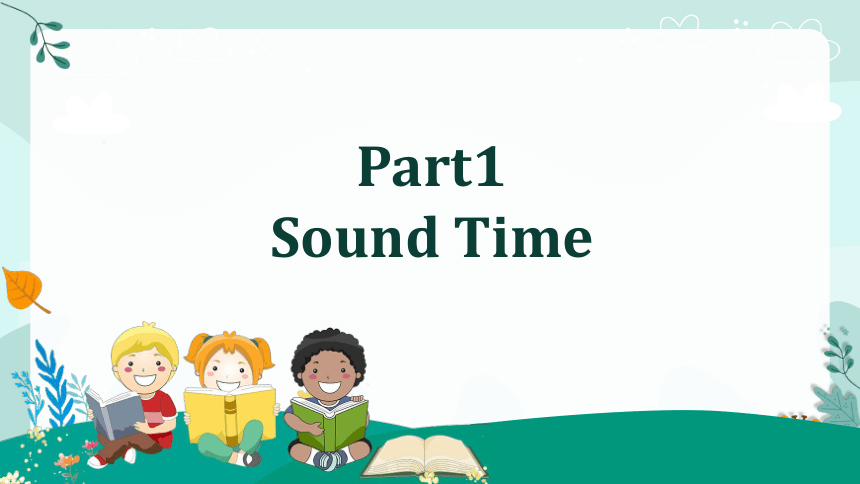
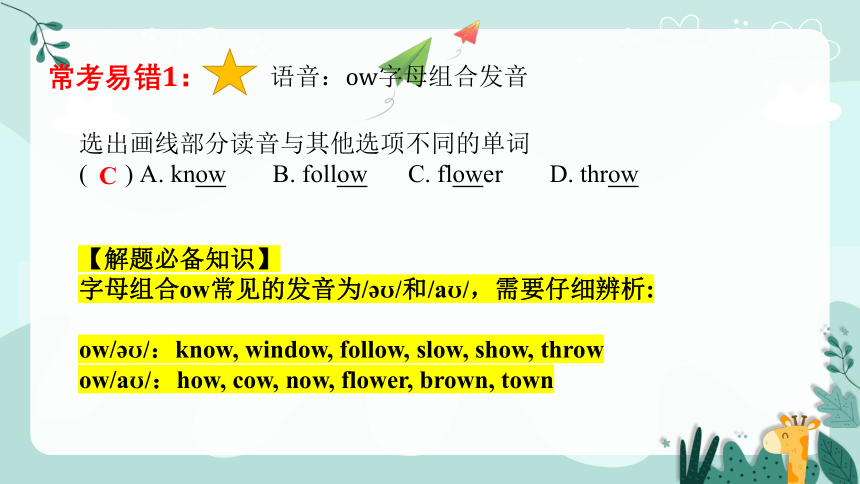
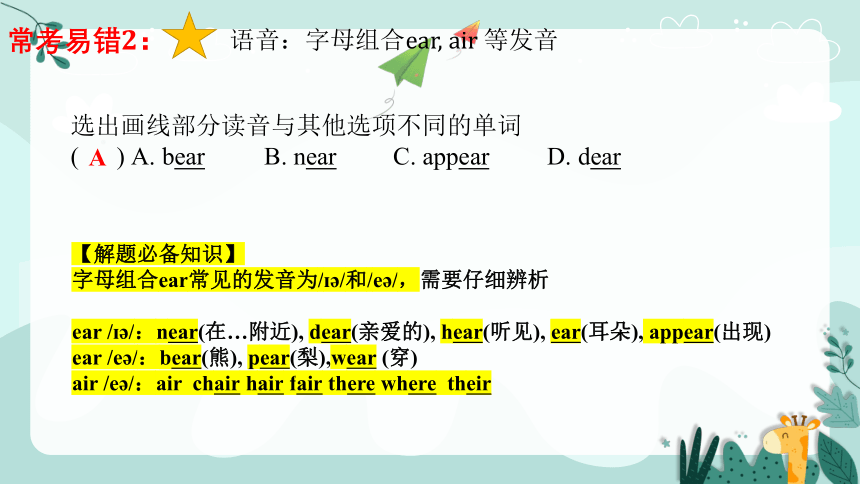
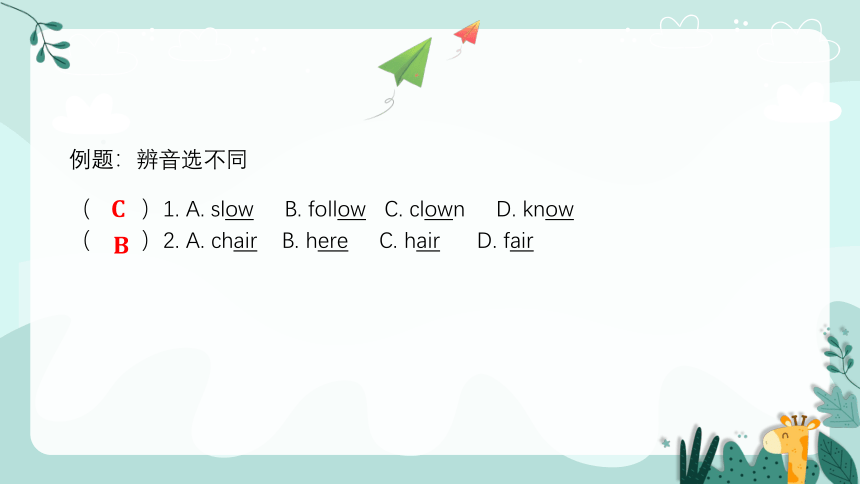

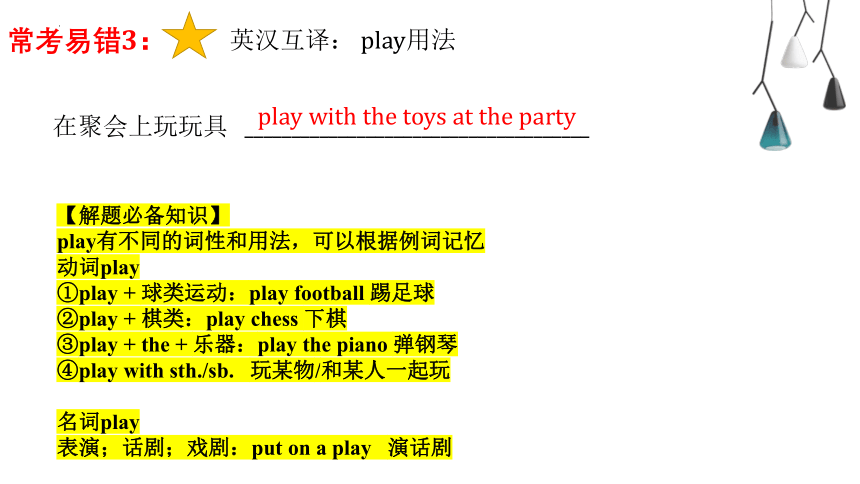
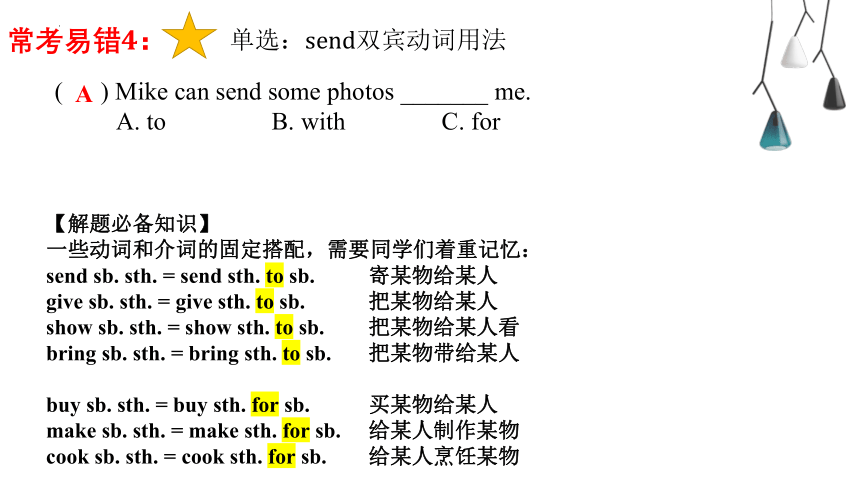
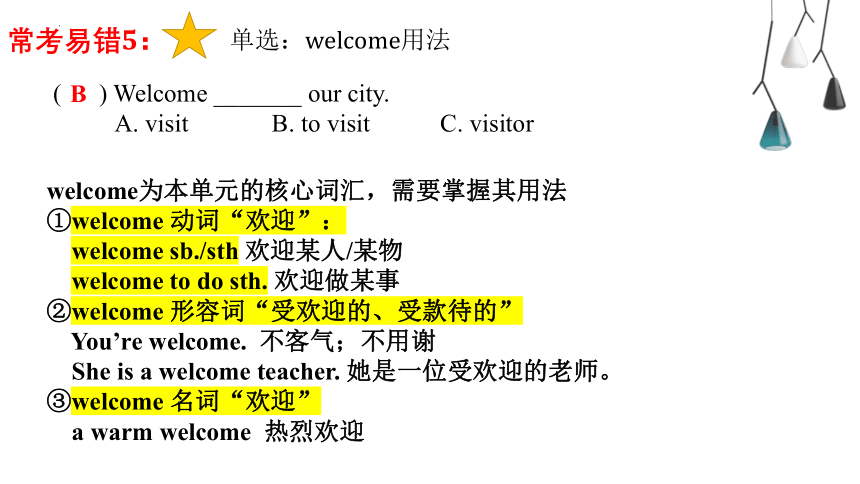
文档简介
(共36张PPT)
Unit5-6 Review
复习
Dictation
1. a western country
2. 将要/打算做某事
3. 在儿童节
4. 朝窗外看
5. 玩这些玩具
6. 晚几分钟
7. 下个月
8. buy some fruit from the supermarket
9. bring some snacks to the party
10. 来自澳大利亚
11. 例如
12. 一些有趣的城市
13. also like Sydney
14. tell you about the UK
进门测
1. Ann and Lily watched a film last night.(改为将来时)
Ann and Lily to watch a film tomorrow.
2. Can you ________ any good idea
A. think of B. think about C. look for
3. There ________ a match in the school tomorrow.
A. are going to be B. will be C. has
are going
目 录
Contents
语音
01
词汇和短语
02
句型全解
03
语法练习
04
Part1
Sound Time
常考易错1:
语音:ow字母组合发音
选出画线部分读音与其他选项不同的单词
( ) A. know B. follow C. flower D. throw
【解题必备知识】
字母组合ow常见的发音为/ /和/a /,需要仔细辨析:
ow/ /:know, window, follow, slow, show, throw
ow/a /:how, cow, now, flower, brown, town
C
常考易错2:
语音:字母组合ear, air 等发音
选出画线部分读音与其他选项不同的单词
( ) A. bear B. near C. appear D. dear
A
【解题必备知识】
字母组合ear常见的发音为/ /和/e /,需要仔细辨析
ear / /:near(在…附近), dear(亲爱的), hear(听见), ear(耳朵), appear(出现)
ear /e /:bear(熊), pear(梨),wear (穿)
air /e /:air chair hair fair there where their
例题:辨音选不同
( )1. A. slow B. follow C. clown D. know
( )2. A. chair B. here C. hair D. fair
C
B
Part2
Vocabulary & Phrase
常考易错3:
在聚会上玩玩具 _____________________________________
英汉互译: play用法
play with the toys at the party
【解题必备知识】
play有不同的词性和用法,可以根据例词记忆
动词play
①play + 球类运动:play football 踢足球
②play + 棋类:play chess 下棋
③play + the + 乐器:play the piano 弹钢琴
④play with sth./sb. 玩某物/和某人一起玩
名词play
表演;话剧;戏剧:put on a play 演话剧
常考易错4:
单选:send双宾动词用法
( ) Mike can send some photos _______ me.
A. to B. with C. for
A
【解题必备知识】
一些动词和介词的固定搭配,需要同学们着重记忆:
send sb. sth. = send sth. to sb. 寄某物给某人
give sb. sth. = give sth. to sb. 把某物给某人
show sb. sth. = show sth. to sb. 把某物给某人看
bring sb. sth. = bring sth. to sb. 把某物带给某人
buy sb. sth. = buy sth. for sb. 买某物给某人
make sb. sth. = make sth. for sb. 给某人制作某物
cook sb. sth. = cook sth. for sb. 给某人烹饪某物
常考易错5:
单选:welcome用法
( ) Welcome _______ our city.
A. visit B. to visit C. visitor
welcome为本单元的核心词汇,需要掌握其用法
①welcome 动词“欢迎”:
welcome sb./sth 欢迎某人/某物
welcome to do sth. 欢迎做某事
②welcome 形容词“受欢迎的、受款待的”
You’re welcome. 不客气;不用谢
She is a welcome teacher. 她是一位受欢迎的老师。
③welcome 名词“欢迎”
a warm welcome 热烈欢迎
B
常考易错7:
单选:there be一将
( )There _______ a fashion show in the school tomorrow afternoon.
A. was B. is going to have
C. will have D. is going to be
【解题必备知识】
①一般将来时表示在将来某一个时间或某段时间内所发生的的动作或状态。
常见的时间状语有:tomorrow, next, soon, this afternoon…
②There be句型表示“某地有某人或某物”;have/has表示“某人有……”。
③There be句型有不同的时态特征,如:
一般现在时:There is/are ...
一般过去时:There was/were...
一般将来时:There will be ... / There is/are going to be ...
D
常考易错6:
单选:“来自于”用法
( ) -- Where _______ Yang Ling _______ from
-- She _______ China.
A. is; come; comes from
B. is; / ; is from
C. does; come; is come from
【解题必备知识】
表示“来自于”有两个短语:
①come from 为实义动词+介词
②be from 为be动词+介词
两者之间可以互相转换:
①She comes from the UK. = She is from the UK.
容易错的句型为一般疑问句:
①Does she come from the UK = Is she from the UK
B
常考易错8:
用所给词的适当形式填空:词义辨析
We became _______ when we heard the _______ news. (excite)
【解题必备知识】
以ed结尾的形容词,通常修饰人; 以ing结尾的形容词,通常修饰事物。
excited
exciting
拓展:
-ed -ing
excited 感到兴奋的 exciting 令人兴奋的
interested 感兴趣的 interesting 有趣的
积累:
1. 对……感到兴奋 ________________________
2. 对……感兴趣 ________________________
be excited about
be interested in
Review Unit5
根据所给首字母或中文提示填空。
1. C____________ Day is coming. All the students are very e____________.
2. I have some f____________. Let's make a salad.
3. Let's eat ____________(首先) and ____________(然后) go out to play.
4. Suddenly, a black bird ____________(出现) and it could fly very high.
5.The party will ____________(开始)at half past eight and ____________(结束) at eleven o'clock.
6.The girl has some colourful ____________(气球).
hildren’s
xcited
ruit
first
then
appeared
begin
end
balloons
Review Unit6
根据所给中文提示填空
1. People in China ____________ ____________(欢迎游客).
2.There will be ____________ ____________ ____________(一场令人兴奋的比赛).
3.You'll find out ____________ ____________ ____________(一些有趣的地方).
4.Spring is ____________ ____________ ____________(多雨的季节)in Nanjing
5.I always go swimming in summer ____________ ____________(每年).
6.Can you tell me something ____________ ____________(关于澳大利亚)?
7.There are many famous cities in the UK, ____________ ____________(例如),
London and Oxford.
8.Our teacher _________ _________ _________(告诉我们关于)the US yesterday.
welcome
visitors
an
exciting
match
some
interesting
places
a
rainy
season
every
year
about
Australia
for
example
told
us
about
Part3
句型全解
Unit5 重要句型
1. The children are going to have a party at Mike’s house.
翻译:______________________________________________________
孩子们打算在迈克家举办一个聚会。
解析:be going to + 动原,意为“打算做某事,将要发生某事”
常见的时间标志词有:tonight, tomorrow, the day after tomorrow, next Tuesday/week…
【例题】
( ) We _____ see a film tomorrow afternoon.
A. go B. are going to C. be going to
B
Unit5 重要句型
2. Are we going to eat or play with the toys first
翻译:______________________________________________________
我们先吃东西还是先玩玩具?
解析:此句是选择疑问句。其答语必须是完整的句子或是这个句子的省略形式,不能用yes或no回答。
【例题】
( ) -- What would you like to drink, tea or coffee
-- _____.
A. Yes, it is. B. Yes, please. C. Tea, please.
C
Unit5 重要句型
3. Bobby’s class is going to have a party soon.
翻译:______________________________________________________
波比的班级不久将要举办一个聚会。
解析:句中的have意思是“举行,举办”。
have还有以下几种意思:
①作“有”讲,表示所属的“有”
②作“吃、喝”讲
③患某种疾病。比如:have a cold
④度过。比如:have a good time
⑤固定搭配:have a look看一看,have a rest休息一下…
Unit5 重要句型
4. I’m going to tell a story.
翻译:______________________________________________________
我打算讲一个故事。
解析:句中的tell意思是“说;告诉;讲述”。
【例题】
( ) Can you _____ me the way to the library
A. say B. tell C. speak
B
①tell常用于tell sb. to do sth. 意思是“告诉某人做某事”
②tell还可以用于tell sb. sth.和 tell sb. about sth.
tell sb. sth. “告诉某人某事(不需要解释说明的事)”
tell sb. about sth. “向某人讲述某事(往往需要解释说明)”
Unit6 重要句型
1. She can send me some photos.
翻译:______________________________________________________
她可以发给我一些照片。
解析:send 意思是“发出”。
重要考点:send sb. sth. = send sth. to sb.
【例题】
I am going to send you some letters.(改为同义句)
________________________________
I am going to send some letters to you.
Unit6 重要句型
2. You will also like Sydney.
翻译:______________________________________________________
你也将会喜欢悉尼。
解析:also意为“也”,用于实意动词前,be动词后。(实前be后)
同义词too,either。
also,too,either三者区别。
also 可用于肯定句和否定句 在句中
too 只能用在肯定句中 在句尾
either 用于否定句中 在句尾
【汉译英】
我的朋友也会说英语。_______________________________
My friend also speaks English.
Unit6 重要句型
3. Sport-lovers will like Australian football games because they are very exciting.
翻译:__________________________________________________________________________________
运动爱好者们将会喜欢澳式橄榄球比赛,因为它们非常激动人心。
解析:① sport-lover 运动爱好者
② Australian football games 澳式橄榄球比赛
【例题】
① He told me an __________(excite) story just now.
② Why are you so __________(excite)
③ Liu Tao is very __________ about the __________film. (excite)
③ exciting 令人兴奋的,修饰事物
excited 感到兴奋的,修饰人
exciting
excited
excited
exciting
Unit6 重要句型
4. What do you think, Sam
翻译:_______________________________
你觉得呢,山姆?
解析:①此句用来询问对方观点或看法的。
【例题】
( ) -- _________________
-- It’s so great!
A. What can you do B. What do you like C. What do you think
C
②当其后边需要接宾语时,通常在think后面加of
或about,即“What do you think of/about…”
Part4
Grammar
一、单项选择。
( ) 1. My dad ______ Beijing next month.
A. will going to B. is going to C. want to go
B
( ) 2. There ______ a concert in Huai’an next month.
A. was B. is going to be C. are
B
( ) 3. Helen ______ have a swimming lesson next Sunday.
A. is going to B. goes to C. went to
A
( ) 4. ______ your brother ______ a magazine from home
A. Are; going to bring
B. Is; going to bring
C. Will; brings
B
( ) 5. — ______ the party going to begin
—It is going to begin at 5 o’clock.
A. What’s B. Where’s C. When’s
C
二、按要求改写句子。
1. We are going to play football tomorrow. (对画线部分提问)
_________ are you _________ to _______ tomorrow
What
going
do
2. Nancy is going to play the violin. (改为一般疑问句)
______ Nancy _________ to play the violin
Is
going
3. We’re going to come home at 4:30. (对画线部分提问)
__________ are ________ going to come home
When
you
4. He ate a nice hot dog this morning. (用tomorrow morning改写句子)
He ______ _________ ______ _______ a nice hot dog tomorrow morning.
is
going
to
eat
5. My father is going to draw pictures in the park. (对画线部分提问)
____________ your father going to draw pictures
Where’s
四、根据汉语提示完成句子。
1. 南希明天要讲故事吗?
Is Nancy _________ to tell __________ tomorrow
going
stories
2. 我们打算下周去北京。
We’re going to Beijing ________ _________ .
next
week
3. 这学期什么时候结束?
___________ this term going to ________
When’s
end
4. 莉莉将为晚会做些什么?
___________ Lily going ______ _______ for the party
What’s
to
do
今天,你学到了什么?
一、辩音/i /和/e /
二、知识点:四会短语+将来时句型+介词使用
三、练习(做题技巧)
Unit5-6 Review
复习
Dictation
1. a western country
2. 将要/打算做某事
3. 在儿童节
4. 朝窗外看
5. 玩这些玩具
6. 晚几分钟
7. 下个月
8. buy some fruit from the supermarket
9. bring some snacks to the party
10. 来自澳大利亚
11. 例如
12. 一些有趣的城市
13. also like Sydney
14. tell you about the UK
进门测
1. Ann and Lily watched a film last night.(改为将来时)
Ann and Lily to watch a film tomorrow.
2. Can you ________ any good idea
A. think of B. think about C. look for
3. There ________ a match in the school tomorrow.
A. are going to be B. will be C. has
are going
目 录
Contents
语音
01
词汇和短语
02
句型全解
03
语法练习
04
Part1
Sound Time
常考易错1:
语音:ow字母组合发音
选出画线部分读音与其他选项不同的单词
( ) A. know B. follow C. flower D. throw
【解题必备知识】
字母组合ow常见的发音为/ /和/a /,需要仔细辨析:
ow/ /:know, window, follow, slow, show, throw
ow/a /:how, cow, now, flower, brown, town
C
常考易错2:
语音:字母组合ear, air 等发音
选出画线部分读音与其他选项不同的单词
( ) A. bear B. near C. appear D. dear
A
【解题必备知识】
字母组合ear常见的发音为/ /和/e /,需要仔细辨析
ear / /:near(在…附近), dear(亲爱的), hear(听见), ear(耳朵), appear(出现)
ear /e /:bear(熊), pear(梨),wear (穿)
air /e /:air chair hair fair there where their
例题:辨音选不同
( )1. A. slow B. follow C. clown D. know
( )2. A. chair B. here C. hair D. fair
C
B
Part2
Vocabulary & Phrase
常考易错3:
在聚会上玩玩具 _____________________________________
英汉互译: play用法
play with the toys at the party
【解题必备知识】
play有不同的词性和用法,可以根据例词记忆
动词play
①play + 球类运动:play football 踢足球
②play + 棋类:play chess 下棋
③play + the + 乐器:play the piano 弹钢琴
④play with sth./sb. 玩某物/和某人一起玩
名词play
表演;话剧;戏剧:put on a play 演话剧
常考易错4:
单选:send双宾动词用法
( ) Mike can send some photos _______ me.
A. to B. with C. for
A
【解题必备知识】
一些动词和介词的固定搭配,需要同学们着重记忆:
send sb. sth. = send sth. to sb. 寄某物给某人
give sb. sth. = give sth. to sb. 把某物给某人
show sb. sth. = show sth. to sb. 把某物给某人看
bring sb. sth. = bring sth. to sb. 把某物带给某人
buy sb. sth. = buy sth. for sb. 买某物给某人
make sb. sth. = make sth. for sb. 给某人制作某物
cook sb. sth. = cook sth. for sb. 给某人烹饪某物
常考易错5:
单选:welcome用法
( ) Welcome _______ our city.
A. visit B. to visit C. visitor
welcome为本单元的核心词汇,需要掌握其用法
①welcome 动词“欢迎”:
welcome sb./sth 欢迎某人/某物
welcome to do sth. 欢迎做某事
②welcome 形容词“受欢迎的、受款待的”
You’re welcome. 不客气;不用谢
She is a welcome teacher. 她是一位受欢迎的老师。
③welcome 名词“欢迎”
a warm welcome 热烈欢迎
B
常考易错7:
单选:there be一将
( )There _______ a fashion show in the school tomorrow afternoon.
A. was B. is going to have
C. will have D. is going to be
【解题必备知识】
①一般将来时表示在将来某一个时间或某段时间内所发生的的动作或状态。
常见的时间状语有:tomorrow, next, soon, this afternoon…
②There be句型表示“某地有某人或某物”;have/has表示“某人有……”。
③There be句型有不同的时态特征,如:
一般现在时:There is/are ...
一般过去时:There was/were...
一般将来时:There will be ... / There is/are going to be ...
D
常考易错6:
单选:“来自于”用法
( ) -- Where _______ Yang Ling _______ from
-- She _______ China.
A. is; come; comes from
B. is; / ; is from
C. does; come; is come from
【解题必备知识】
表示“来自于”有两个短语:
①come from 为实义动词+介词
②be from 为be动词+介词
两者之间可以互相转换:
①She comes from the UK. = She is from the UK.
容易错的句型为一般疑问句:
①Does she come from the UK = Is she from the UK
B
常考易错8:
用所给词的适当形式填空:词义辨析
We became _______ when we heard the _______ news. (excite)
【解题必备知识】
以ed结尾的形容词,通常修饰人; 以ing结尾的形容词,通常修饰事物。
excited
exciting
拓展:
-ed -ing
excited 感到兴奋的 exciting 令人兴奋的
interested 感兴趣的 interesting 有趣的
积累:
1. 对……感到兴奋 ________________________
2. 对……感兴趣 ________________________
be excited about
be interested in
Review Unit5
根据所给首字母或中文提示填空。
1. C____________ Day is coming. All the students are very e____________.
2. I have some f____________. Let's make a salad.
3. Let's eat ____________(首先) and ____________(然后) go out to play.
4. Suddenly, a black bird ____________(出现) and it could fly very high.
5.The party will ____________(开始)at half past eight and ____________(结束) at eleven o'clock.
6.The girl has some colourful ____________(气球).
hildren’s
xcited
ruit
first
then
appeared
begin
end
balloons
Review Unit6
根据所给中文提示填空
1. People in China ____________ ____________(欢迎游客).
2.There will be ____________ ____________ ____________(一场令人兴奋的比赛).
3.You'll find out ____________ ____________ ____________(一些有趣的地方).
4.Spring is ____________ ____________ ____________(多雨的季节)in Nanjing
5.I always go swimming in summer ____________ ____________(每年).
6.Can you tell me something ____________ ____________(关于澳大利亚)?
7.There are many famous cities in the UK, ____________ ____________(例如),
London and Oxford.
8.Our teacher _________ _________ _________(告诉我们关于)the US yesterday.
welcome
visitors
an
exciting
match
some
interesting
places
a
rainy
season
every
year
about
Australia
for
example
told
us
about
Part3
句型全解
Unit5 重要句型
1. The children are going to have a party at Mike’s house.
翻译:______________________________________________________
孩子们打算在迈克家举办一个聚会。
解析:be going to + 动原,意为“打算做某事,将要发生某事”
常见的时间标志词有:tonight, tomorrow, the day after tomorrow, next Tuesday/week…
【例题】
( ) We _____ see a film tomorrow afternoon.
A. go B. are going to C. be going to
B
Unit5 重要句型
2. Are we going to eat or play with the toys first
翻译:______________________________________________________
我们先吃东西还是先玩玩具?
解析:此句是选择疑问句。其答语必须是完整的句子或是这个句子的省略形式,不能用yes或no回答。
【例题】
( ) -- What would you like to drink, tea or coffee
-- _____.
A. Yes, it is. B. Yes, please. C. Tea, please.
C
Unit5 重要句型
3. Bobby’s class is going to have a party soon.
翻译:______________________________________________________
波比的班级不久将要举办一个聚会。
解析:句中的have意思是“举行,举办”。
have还有以下几种意思:
①作“有”讲,表示所属的“有”
②作“吃、喝”讲
③患某种疾病。比如:have a cold
④度过。比如:have a good time
⑤固定搭配:have a look看一看,have a rest休息一下…
Unit5 重要句型
4. I’m going to tell a story.
翻译:______________________________________________________
我打算讲一个故事。
解析:句中的tell意思是“说;告诉;讲述”。
【例题】
( ) Can you _____ me the way to the library
A. say B. tell C. speak
B
①tell常用于tell sb. to do sth. 意思是“告诉某人做某事”
②tell还可以用于tell sb. sth.和 tell sb. about sth.
tell sb. sth. “告诉某人某事(不需要解释说明的事)”
tell sb. about sth. “向某人讲述某事(往往需要解释说明)”
Unit6 重要句型
1. She can send me some photos.
翻译:______________________________________________________
她可以发给我一些照片。
解析:send 意思是“发出”。
重要考点:send sb. sth. = send sth. to sb.
【例题】
I am going to send you some letters.(改为同义句)
________________________________
I am going to send some letters to you.
Unit6 重要句型
2. You will also like Sydney.
翻译:______________________________________________________
你也将会喜欢悉尼。
解析:also意为“也”,用于实意动词前,be动词后。(实前be后)
同义词too,either。
also,too,either三者区别。
also 可用于肯定句和否定句 在句中
too 只能用在肯定句中 在句尾
either 用于否定句中 在句尾
【汉译英】
我的朋友也会说英语。_______________________________
My friend also speaks English.
Unit6 重要句型
3. Sport-lovers will like Australian football games because they are very exciting.
翻译:__________________________________________________________________________________
运动爱好者们将会喜欢澳式橄榄球比赛,因为它们非常激动人心。
解析:① sport-lover 运动爱好者
② Australian football games 澳式橄榄球比赛
【例题】
① He told me an __________(excite) story just now.
② Why are you so __________(excite)
③ Liu Tao is very __________ about the __________film. (excite)
③ exciting 令人兴奋的,修饰事物
excited 感到兴奋的,修饰人
exciting
excited
excited
exciting
Unit6 重要句型
4. What do you think, Sam
翻译:_______________________________
你觉得呢,山姆?
解析:①此句用来询问对方观点或看法的。
【例题】
( ) -- _________________
-- It’s so great!
A. What can you do B. What do you like C. What do you think
C
②当其后边需要接宾语时,通常在think后面加of
或about,即“What do you think of/about…”
Part4
Grammar
一、单项选择。
( ) 1. My dad ______ Beijing next month.
A. will going to B. is going to C. want to go
B
( ) 2. There ______ a concert in Huai’an next month.
A. was B. is going to be C. are
B
( ) 3. Helen ______ have a swimming lesson next Sunday.
A. is going to B. goes to C. went to
A
( ) 4. ______ your brother ______ a magazine from home
A. Are; going to bring
B. Is; going to bring
C. Will; brings
B
( ) 5. — ______ the party going to begin
—It is going to begin at 5 o’clock.
A. What’s B. Where’s C. When’s
C
二、按要求改写句子。
1. We are going to play football tomorrow. (对画线部分提问)
_________ are you _________ to _______ tomorrow
What
going
do
2. Nancy is going to play the violin. (改为一般疑问句)
______ Nancy _________ to play the violin
Is
going
3. We’re going to come home at 4:30. (对画线部分提问)
__________ are ________ going to come home
When
you
4. He ate a nice hot dog this morning. (用tomorrow morning改写句子)
He ______ _________ ______ _______ a nice hot dog tomorrow morning.
is
going
to
eat
5. My father is going to draw pictures in the park. (对画线部分提问)
____________ your father going to draw pictures
Where’s
四、根据汉语提示完成句子。
1. 南希明天要讲故事吗?
Is Nancy _________ to tell __________ tomorrow
going
stories
2. 我们打算下周去北京。
We’re going to Beijing ________ _________ .
next
week
3. 这学期什么时候结束?
___________ this term going to ________
When’s
end
4. 莉莉将为晚会做些什么?
___________ Lily going ______ _______ for the party
What’s
to
do
今天,你学到了什么?
一、辩音/i /和/e /
二、知识点:四会短语+将来时句型+介词使用
三、练习(做题技巧)
